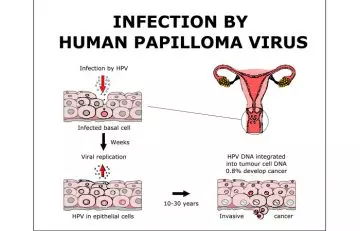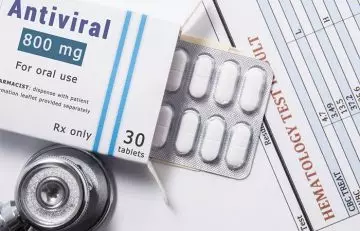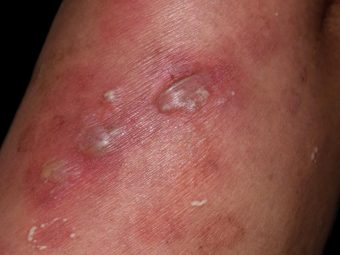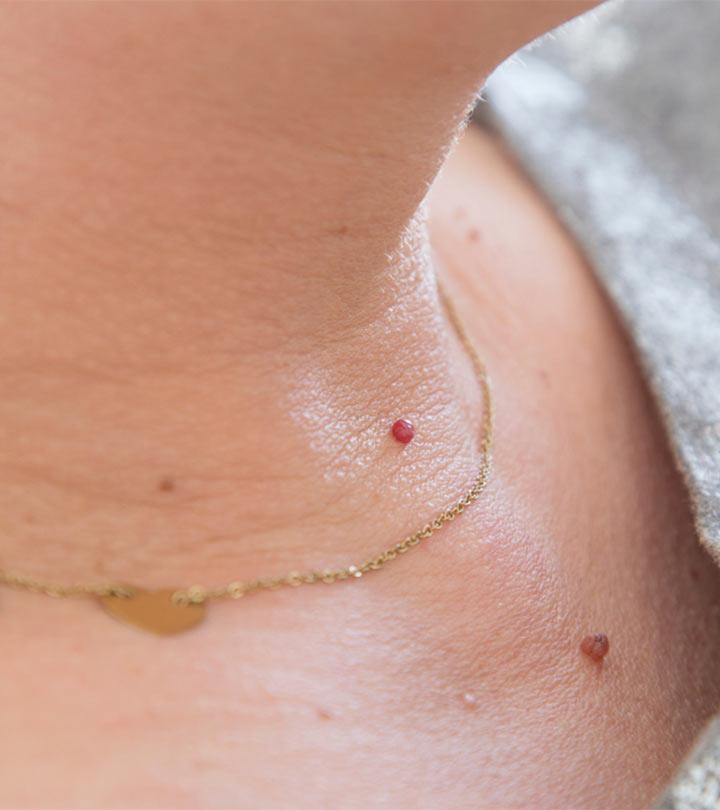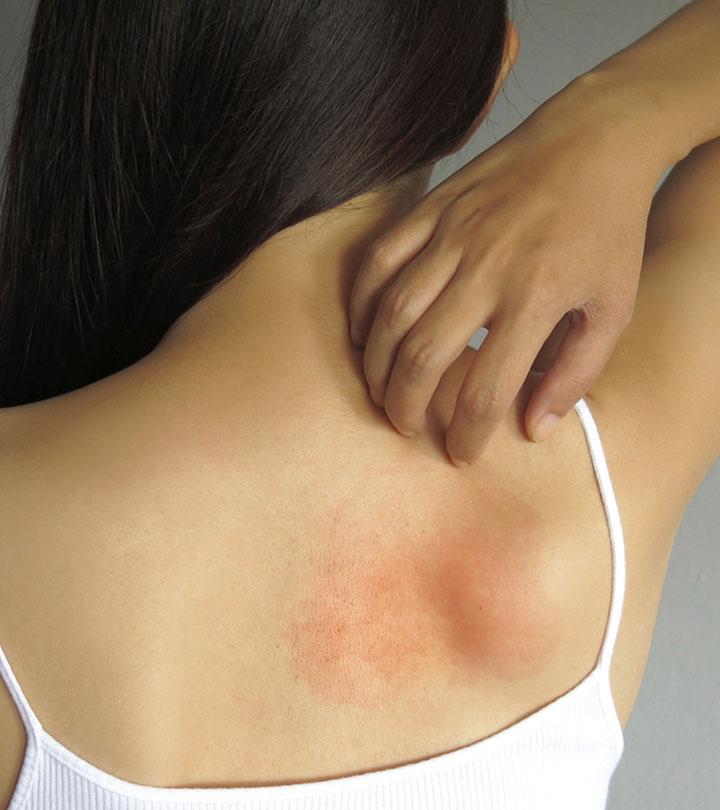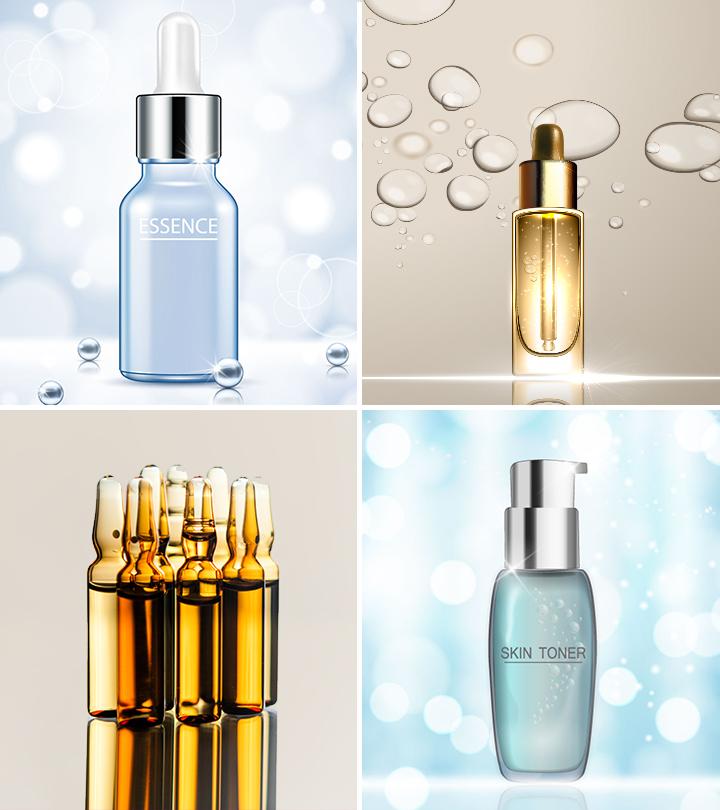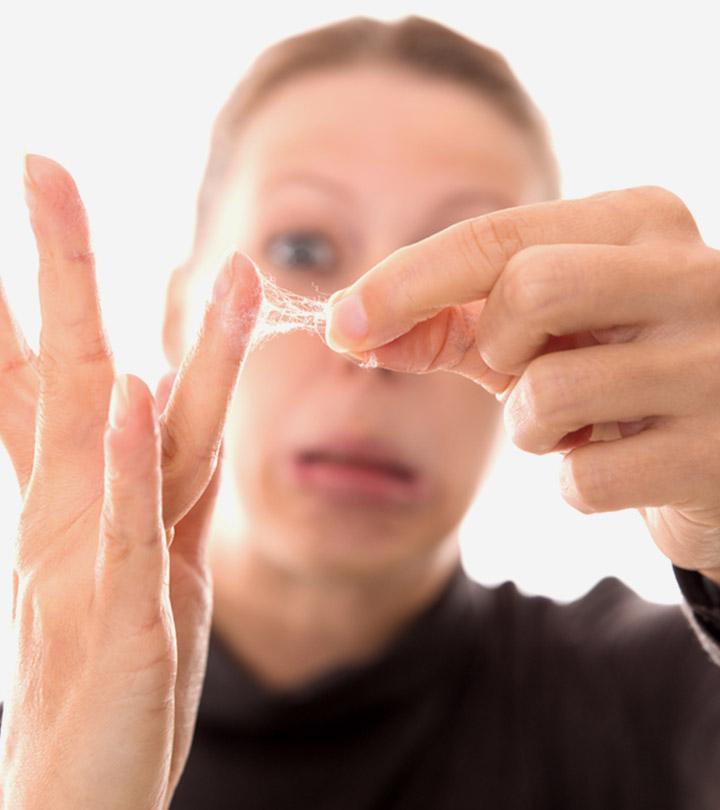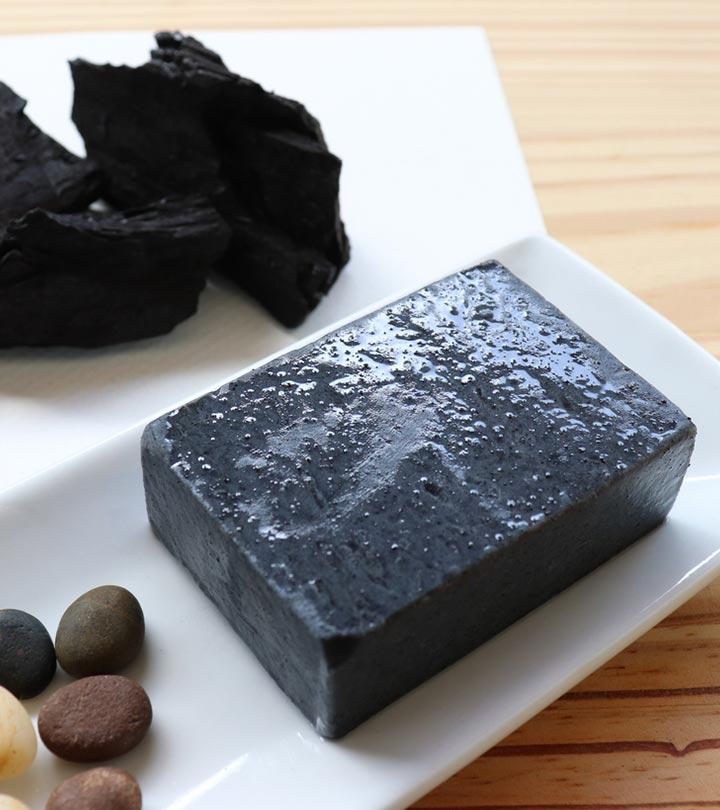Genital Warts Vs. Herpes: The Complete Guide
Knowing the differences between the two conditions is key to getting the right treatment.

Image: Shutterstock
The debate on genital warts vs. herpes is quite old and common. It is because both are tough to tell apart. As per the World Health Organization, over a million cases of sexually transmitted infections occur every day. This includes both genital warts and herpes. They have similar symptoms, which is why most people confuse between the two. This article attempts to settle the debate and distinguish genital warts from herpes. Read on.
In This Article
What Are Genital Warts?
Genital warts (Condylomata acuminata) are one of the most common sexually transmitted diseases caused by the Human Papillomavirus (HPV). The warts appear like flesh-colored papules on the genitals. HPV is a highly contagious virus transmitted through genital, oral, and anal sexual contact (2). Herpes is quite different from genital warts. Let’s find out.
A study was conducted on 11,096 individuals in Italy in 2015. A total of 9259 questionnaires were analyzed to study the prevalence of genital warts in a sample university population. Out of all participants, Overall, 124 individuals (1.3%) were diagnosed with genital warts, out of which 48 men (1.3%) were men and 76 women (1.4%). The highest incidence was recorded amongst men (5.6%) and women (6.9%) who were 30 and above.
 Did You Know?
Did You Know?What Is Herpes?
Herpes is caused by the herpes simplex virus (HSV). The two types of viruses – HSV1 and HSV-2 may affect any body part, including genitals, and cause pimple-like bumps, blistersi XA skin condition in which small, reddish, pus-filled bubbles form due to burning, chafing, and friction. , vesiclesi XA skin condition that is conceptually the same as blisters except the fluid-filled sacs are less than 5mm in diameter. , and papulesi XRaised, swollen, and tender patches on the skin triggered due to contact with skin irritants or allergens. .
The Centre for Disease Control estimates that approximately over five lakh people are diagnosed with herpes every year in the United States. Out of this, 11.9% of the people are between 14 and 49 years (3), (4).
 Did You Know?
Did You Know?The symptoms of herpes and genital warts may differ in numerous aspects. Let’s take a look at them.
Genital Warts Vs. Herpes: Symptoms
| Genital Warts | Herpes |
|---|---|
| Small flesh-colored bumps in the genital area | Red blisters and bumps around the genitals |
| Itching in the genital area | Pain, tenderness, and itching in the genital area |
| Bleeding from the genital during intercourse | Blisters may rupture and bleed and cause pain during urination. |
| Warts may multiply into clusters | The skin might crust and form scabs |
The symptoms of genital warts and herpes seem to be similar. However, you can distinguish them by their appearance. Herpes and genital warts spread through skin-to-skin contact. Let’s learn in detail.
How Do You Get Herpes And Genital Warts?
You can contract genital warts through:
- Unprotected vaginal and anal intercourse and oral sex
- Sharing sex toys with an infected person
In rare cases, it may be passed down from the mother to her child (known as vertical transmission during delivery).
Herpes is transmitted through (2), (4):
- Body fluids like saliva (through oral sex or kissing)
- Unprotected sexual intercourse
- Touching active sores
It can be passed on from the mother to her newborn child (neonatal herpes).
Avoid sexual intercourse with a partner who may have either genital warts or herpes. It’s better to get tested to avoid spreading the viral infection. Both STIs are non-curable.
Sarah, a blogger, shares her personal experience of contracting genital herpes after a casual sexual encounter. She recounts the physical and emotional aspects of the outbreak, including symptoms and the mental toll it took, and writes: “This was a week after I’d had sex, sex wasn’t even on my mind! But now it kinda burns when I pee, and that is the first sign of an STI — that’s a surefire thing I did remember from sex ed. By Saturday, yo, I. WAS. ON. FIRE. I couldn’t stand, lay down or sit comfortably.” She continues, “First time I looked it was super red and I had 3 open sores that I could see, next time it was I think one or two more, all on the inside lips of my labia.” Despite the initial shock and emotional turmoil, Sarah emphasizes that herpes does not define a person and encourages self-acceptance and resilience (i).
An early diagnosis can help control the symptoms. Check out the treatment options in the next section to combat these skin infections.
Genital Warts Vs. Herpes: Treatment Options
Since both are non-curable, doctors usually resort to either prevention or managing the symptoms and try to combat further health complications.
For managing herpes, doctors may prescribe:
- Antiviral medications and creams like acyclovir, valacyclovir, and famciclovir
For managing genital warts, doctors may prescribe
- Podophyllotoxin gel or cream to clear warts. Clinical trials found 0.5% podofilox to be quite effective in wart removal (5).
- Cryotherapy also helps remove genital warts (6). This procedure uses liquid nitrogen to freeze and destroy warts.
However, remember that the treatment methods can treat the symptoms but not eliminate or cure the virus. However, it is possible to prevent these conditions. Let’s delve into the details!
Prevention Tips
- Safe Sex: Consistently use latex or polyurethane condoms during sex for a significant reduction of transmission risk. Condoms don’t offer complete protection, but they help.
- Monogamy: Being in a mutually monogamous relationship where both of you are free from these infections decreases the risk.
- Vaccination: For HPV, vaccines such as Gardasil can prevent certain strains that cause genital warts. Consult a healthcare professional for eligibility.
- Regular Screening: Regular check-ups and screenings can help diagnose these infections early to allow for timely treatment.
- Abstain During Outbreaks: Avoid sexual contact during outbreaks or active symptoms to prevent transmission.
- Healthy Lifestyle: A strong immune system through a balanced diet, regular exercise, and managing stress can help your body resist infections better.
- Education: Knowledge about these infections is crucial for prevention, as it enables informed decisions and reduces the risk of transmission.
Infographic: Major Differences Between Genital Warts And Herpes
Genital warts and herpes are transmitted sexually, but they are not the same. The two skin issues have differences in appearance, symptoms, and treatment options. The infographic below will help you understand these differences in detail. Check it out!
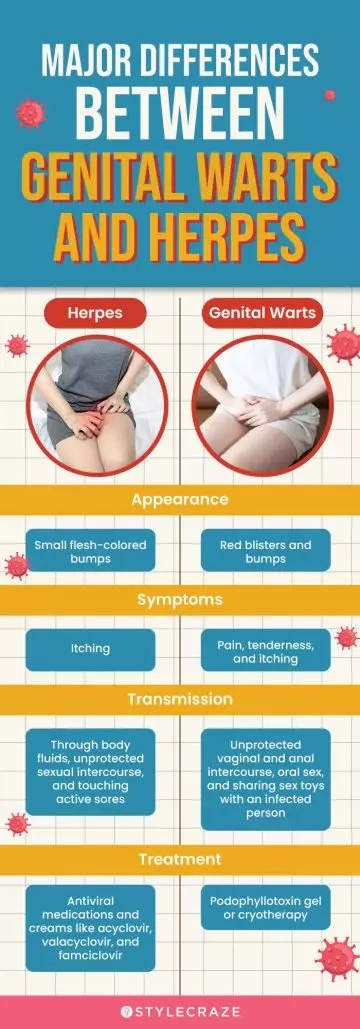
Illustration: StyleCraze Design Team
Both genital warts and herpes are sexually transmitted diseases that can be contracted through bodily fluids, shared needles, or unprotected sexual intercourse, thus making it crucial to maintain proper sexual health. While the symptoms may seem similar, genital warts are flesh-colored bumps that appear on the genitals, while herpes results in painful and itchy red blisters around the genitals. Since both diseases are incurable, early diagnosis can help doctors prevent or manage the symptoms through prescribed medications and surgical procedures. We hope this article clarifies the confusion surrounding genital warts vs. herpes.
Frequently Asked Questions
Which is worse: genital warts or herpes?
Both sexually transmitted diseases (STDs) are equally harmful and exhibit many similar symptoms. However, anecdotal evidence suggests that herpes tends to be more painful than genital warts.
Can genital warts turn into herpes?
No. Both STDs are caused by different viruses, and genital warts cannot develop into herpes.
Are genital warts contagious for life?
Yes. Genital warts and their causative virus are contagious. It is possible to transmit them even after warts have receded.
Key Takeaways
- Genital warts and herpes are sexually transmitted diseases that are difficult to distinguish from each other.
- Genital warts are caused by the Human Papillomavirus (HPV), while herpes is caused by the Herpes Simplex Virus (HSV).
- Genital warts and herpes share genital lesions as one of their common characteristics.
- A timely diagnosis can help control the symptoms with medications and other procedures, but neither is curable.
Get tips on identifying symptoms and understanding the differences between genital herpes and warts in this informative video. Empower yourself with knowledge for better health and peace of mind.
Personal Experience: Source
StyleCraze's articles are interwoven with authentic personal narratives that provide depth and resonance to our content. Below are the sources of the personal accounts referenced in this article.
i. Herpes Diagnosis: My Storyhttps://medium.com/@PositivelyPositivePodcast/herpes-diagnosis-my-story-c73866b59ee8
References
Articles on StyleCraze are backed by verified information from peer-reviewed and academic research papers, reputed organizations, research institutions, and medical associations to ensure accuracy and relevance. Read our editorial policy to learn more.
- Sexually Transmitted Infections
https://www.who.int/news-room/fact-sheets/detail/sexually-transmitted-infections-(stis) - Genital Warts
https://www.ncbi.nlm.nih.gov/labs/pmc/articles/PMC3390234/ - Genital Herpes
https://www.cdc.gov/std/herpes/stdfact-herpes-detailed.htm - Herpes Simplex Virus
https://www.who.int/news-room/fact-sheets/detail/herpes-simplex-virus - ’A Double-blind\’ Randomized Trial of 0.5% Podofilox and Placebo for the Treatment of Genital Warts in Women
https://pubmed.ncbi.nlm.nih.gov/2014088/ - Cryotherapy of Genital Warts
https://www.ncbi.nlm.nih.gov/labs/pmc/articles/PMC6853748/ - Why Genital Herpes Boosts the Risk of HIV Infection
https://www.nih.gov/news-events/nih-research-matters/why-genital-herpes-boosts-risk-hiv-infection





